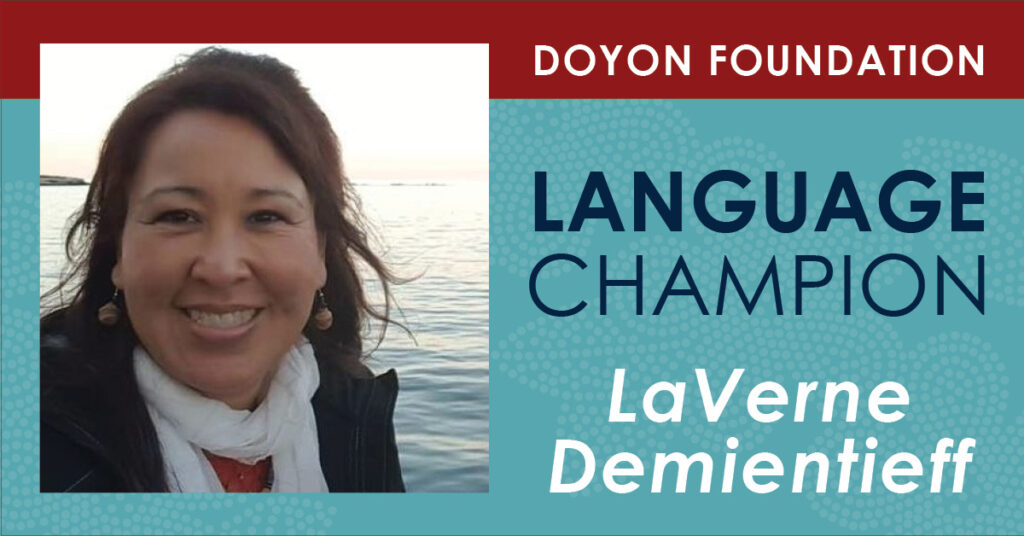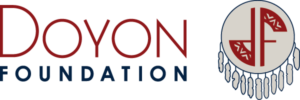
“Language learning inspires feelings of connectedness and support”
– LaVerne Demientieff
LaVerne Xilegg Dementieff is the daughter of the late Rudy Demientieff of Holy Cross and Alice Frank Demientieff of Anvik and Holy Cross. She was raised in Nenana and Anchorage and at the family fish camp along the Yukon River. Her maternal grandparents are Joe Frank and Marcia Reed from Anvik, and her paternal grandparents are Stanley Demientieff and Edith Bifelt from Holy Cross and Hughes. LaVerne lives in Fairbanks.
A learner and teacher of Deg Xinag, among the Athbascan family of languages, LaVerne is an associate professor in the department of social work at the University of Alaska Fairbanks (UAF), where she has taught since 2006. A project to use technology to expand Deg Xinag language learning earned her the Digital Knowing Sharing fellowship in 2019 at the American Philosophical Association, with funding by the Andrew W. Mellon Foundation.
In 2020, LaVerne received the Dennis Demmert Award through UAF’s Rural Student Services for exemplary efforts to advance UAF’s goal of being the educational center for Alaska Native students. She was awarded the Robert Piacenza Excellence in Teaching Award in 2019, presented by the UAF Honors Program.
LaVerne was a member of the Doyon Foundation language revitalization committee from 2016 – 2020 and chaired the committee from 2018 – 2020. She is a past recipient of Doyon Foundation academic scholarships and holds a doctorate in social work from the University of Utah.
LaVerne was featured in the September Language Journeys episode, produced in partnership with Doyon Foundation and the Morris Thompson Cultural and Visitors Center. The episode is viewable on the Morris Thompson Center website.
Doyon Foundation: LaVerne, congratulations on your longstanding efforts to teach and learn the Deg Xinag language. How did you begin?
LaVerne Dementieff: I started learning the language in 2002 in a Deg Xinag language course at UAF, where I was an undergraduate. The class was taught by Beth Dementi Leonard and Alice Taff, along with Elders from my region. The love and support of Elders were a turning point that sparked a passion for learning the language. My main teachers for the past 20 years have included the late Jim Dementi from Shageluk and Edna Deacon from Grayling.
DF: Language learners and teachers often say that strong motivators are time spent with Elders and finding others to learn alongside. How have you found language learning and teaching to be a source of community?
LD: Language connects me to who I am as a Deg Xit’an person, to the land, nature, culture, spirit, family and community. It supports a sense of belonging, healing and wellness in my life. I am always inspired by Elders and others — connecting, learning, teaching, striving toward language wellness and bringing language into the future. I’m a Deg Xinag content creator for Doyon Languages Online, where I enjoy creating videos and short lessons. I’m super proud and honored to be part of the Deg Xinag team for Doyon Languages Online. It’s been transformative, healing and super fun.
DF: Language revitalization becomes much more than a solo pursuit.
LD: Yes. For instance, I’d love to learn from other Dene languages. I believe this type of connection and collaboration enhances understanding of our language while it inspires ideas and feelings of connectedness and support. I’m hoping to attend a Dene language conference and collaborate among languages in addition to Deg Xinag. That’s so exciting to me.
DF: As a student and teacher, what would you advise others to look for in a helpful language learning setting?
LD: Some of the techniques I’ve found are to always incorporate a safe and loving space to help overcome potential stress and trauma and fear. Mistakes are OK! There’s no need to put pressure on ourselves to be perfect.
I also recommend language retreats of two or three days – longer if that’s possible. After attending these retreats, I sometimes will dream about the language and speaking it.
The Deg Xinag language learners circle that I facilitate over Zoom and through Facebook are examples of other settings. And I’m hoping to find funding to do more retreats with Elders. When I first started out, I didn’t have a community of learners to stay connected with outside of a class or an event. I think creating learning communities has been the most beneficial thing for me.
DF: Like so many other language learners we’ve heard from, you’ve stressed that work with Doyon Languages Online supports identity.
LD: It’s language documentation that will go forward so that future generations can benefit from the language as well. That’s profound. Xisrigidisddhinh. I am so grateful. Dogidinh. Thank you.
About Doyon Languages Online
Through the Doyon Language Online project, Doyon Foundation is developing introductory online lessons for Benhti Kokhut’ana Kenaga’ (Lower Tanana), Deg Xinag, Denaakk’e (Koyukon), Dihthaad Xt’een Iin Aanděeg’ (Tanacross), Dinak’i (Upper Kuskokwim), Dinjii Zhuh K’yaa (Gwich’in), Hän, Holikachuk and Nee’aanèegn’ (Upper Tanana).
The project officially launched in summer 2019 with the first four courses, now available for free to all interested learners.
Doyon Languages Online is funded by a three-year grant from the Administration for Native Americans (ANA), awarded in 2016, and an additional three-year grant from the Alaska Native Education Program (ANEP), awarded in 2017.
About the Language Champion Profile Series
As Doyon Foundation continues to grow our language revitalization efforts in the Doyon region, we believe it is important to recognize people who are committed to learning and perpetuating their ancestral language. We are pleased to share some of these “language champion” profiles with you.
If you know a language champion, please nominate him or her by contacting our language program director at [email protected]. Language champions may also complete our profile questionnaire here.
You may learn more about our language revitalization program on our website, or sign up to access the free Doyon Languages Online courses here.
